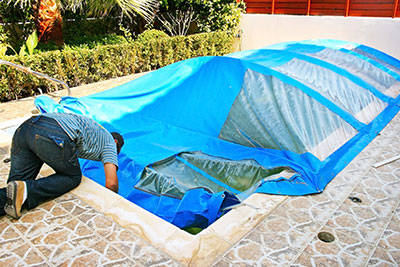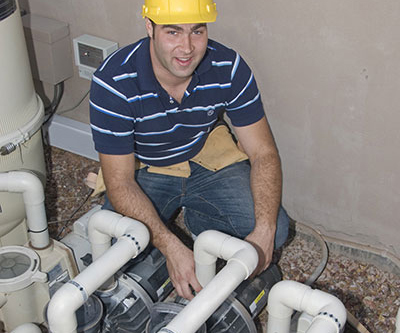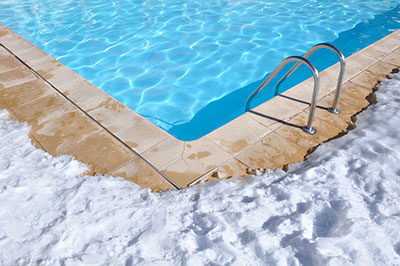Tips for Winter Pool Maintenance
Written by Admin and published on https://www.swimmingpool.com/.
This article talks about winter pool maintenance tips, and advice for which problems you should be watching for with your swimming pool over the winter season. If you live in an area that does not get cold enough to worry about water freezing then you do not really “close” the pool, so much as you put it on a minimal maintenance schedule. So long as you scoop the leaves, vacuum the bottom, and keep some chlorine in the water, then the pool will most likely stay clear. Cool weather causes less chlorine consumption, as well as slower bacteria and algae growth, and if the weather is too cold to swim then there is no appreciable bather load either. Cool weather pools that operate during the winter season simply need to keep the water circulating and filtering, and continue to perform the same maintenance as during the swimming season…just much less than when the pool is beinng used regularly.
Winter Pool Maintenance: The Right Way
Whether you’re in a blanket of snow or sitting pretty in suntan city, winter pool maintenance is a must. Taking care of your pool now can save you money once it’s time to open your pool again in the spring, not to mention preventing any damage due to freezing temperatures or contaminated water. Maintain your investments by protecting your swimming pool from winter damage. In this blog, we’ll go over the importance of covering the pool, maintaining the equipment, and balancing the chemicals during the cold season.
Pool Covers
In colder areas, pool closing begins immediately after pool season to protect your pool from the harsh conditions. Adding a pool cover is a necessity to protect your pool from snow, debris and animals, so it’s important all pool owners understand how to maintain them. Here’s how to keep your pool cover in good shape:

- First, ensure that your winter pool cover is securely attached to your pool. That can mean for an above ground pool inflating the air pillow, tightening the cable, or securing cover clips. For an inground pool, you need to make sure the water blocks or bags are secured and all your safety components are in place.
- Remove debris and water off your pool cover. Use a hose to remove plant debris, such as leaves and twigs, and a vacuum to remove any excess water.
- Use a roof rake to pull the snow off your pool cover. The excess weight can cause damage, especially when dealing with above ground pools. It’s easiest to remove the snow when it’s still fresh, but always make sure to take the proper safety precautions when dealing with snow and ice.
Pool Parts
Pool parts may be tucked out of sight and forgotten about when you’re not concerned with using your pool. No matter your geographical location, pool parts need periodic maintenance to keep them running as good as new. Don’t forget these vital steps to keeping your pool parts in working condition:

- Check your pool pump, filter and heater periodically to ensure everything is working properly. If these parts are not properly maintained, this can cost you a pretty penny down the road.
- While checking your pool parts, ensure all excess water has been removed. Freezing water can cause your pipes to crack creating a much larger problem.
- When in doubt, contact your local pool professional for help in maintaining your pool during the winter.
Winter Pool Chemistry
Most of us do not completely drain our pool for winter, so chemically balanced water is key to a clean swimming pool. Balanced water will prevent algae, bacteria, waterlines, and decontamination making the opening process much easier for pool owners. Follow these tips to maintain your pool water while your pool is closed:
- Check your pool chemistry every two months when not in use. Improperly balanced pool chemistry can be the cause of algae and bacteria growth.
- Discard all pool chemicals from the previous season. You don’t want to save the chemicals for the following year as they lose their potency.
- Use an enzyme product to help break down non-living contamination and prevent a waterline ring from forming. Adding this product will save you from having to scrub your pool tile or finish when opening your pool in the spring.
- If you live in a warmer climate where your swimming pool is left uncovered during the winter, it is still important to maintain your pool. Remember, this is the water you will be swimming in during the warmer months. Keep your pool clean and decontaminated to avoid any potential health risks.
Winter Freeze Alerts
When the temperatures get warmer and the ice starts to melt, the last thing you want to see is a cracked pipe or a leak in your pool liner. If you live in an area that requires pool preparation for freezing temperatures, knowing when it’s time to get your pool ready can save you from any potential damage.

- Consider a digital timer with a temperature sensor to notify you of dangerous temperatures.
- To know when the next freeze will be, set weather app alerts to your phone. This will give you quick access to your local weather forecast and allow for you to make arrangements to ensure your pool is ready for the icy days ahead.
Taking the initiative to maintain your pool during the winter months will save you time and money come spring. If you have any questions or simply want to leave it to the pros, contact your local pool specialist. Have any other winter maintenance tips for pool owners? Share them on the comments below!
Original post here https://ift.tt/35sGHXK.
The post Tips for Winter Pool Maintenance appeared first on Total Pool Safety Solutions.
from Total Pool Safety Solutions https://ift.tt/3dYWa5O
via IFTTT
Comments
Post a Comment